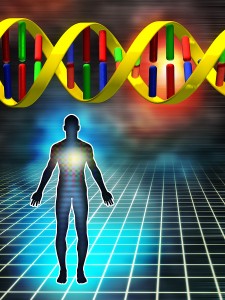 According to a recent article in The News & Observer (Raleigh-Durham, NC) that was reprinted by the Life Extension Institute, research is now showing that much emotional eating is due to our genes.
According to a recent article in The News & Observer (Raleigh-Durham, NC) that was reprinted by the Life Extension Institute, research is now showing that much emotional eating is due to our genes.
“Rich foods work much like heroin on the brain, making it hard to stop eating them. A recent study indicates a genetic link between overeating and drug addiction, explaining why obese people have such intense cravings and build up such tolerance. …
“A team of scientists that included UNC-Chapel Hill researchers reported in 2009 that they had found a gene, NRXN3, associated with obesity in some people. The same gene previously was identified as playing a role in substance abuse.
“Keri Monda, an epidemiologist at the UNC Gillings School of Global Public Health and one of the study’s authors, said the finding draws a strong inherited link between overeating and drug addiction, problems characterized by difficulties limiting enjoyable experiences.
“‘We do know there are common underpinnings,’ Monda said, adding that additional studies are needed to make a definitive association.”
The problem with “evidence” showing that psychological problems really are biological/physiological problems is that the psychological problems go away when the psychological aspects are resolved.
Depression is not a brain problem
Several years ago Time reported a study that used magnetic resonance imaging (MRI) to detect distinct changes in the brains of chronically depressed people compared to the brains of non-depressed people. This was interpreted to mean that the cause of the depression was the changes in the brain. The article went on to report that after a few months of cognitive-behavioral therapy, the patients reported their depression was gone. At which time the MRI showed a “normal” brain.
In other words, the different brain state was not a cause of the depression, it was the result of the depression.
Genes do not cause overeating
Similarly, there might be genes that predispose one to eat sweets or to continue to eat when one is not hungry, but my personal evidence that genes are not the cause of emotional eating and being overweight is that when people eliminate all the conditionings and beliefs that appear to be the source of the eating problem, overeating stops. Without any changes in the genes.
Dr. Bruce Lipton is a former medical school professor and research scientist. His experiments, and that of other leading edge scientists, have examined in great detail the processes by which cells receive information. The implications of this research radically change our understanding of life. It shows that genes and DNA do not control our biology; that instead DNA is controlled by signals from outside the cell, including the energetic messages emanating from our positive and negative thoughts. (See his book, The Biology of Belief.)
In other words, our genes and DNA only contribute a “potential” that must be activated by our interactions with reality and by our beliefs. If the outside environment (the source of our belief and conditionings) does not activate a gene, it has no impact on us at all.
As many biologists have said, “Genes load the gun, but environment pulls the trigger.”
That being the case, don’t worry about whether or not you have the wrong genes or brain structure. If you have an emotional eating problem, get rid of the conditionings and beliefs that really cause it and the overeating will stop— regardless of your genes and brain structure.
For more details, please see my eBook, The Secret to Ending Overeating For Good, at http://emotionaleatingreport.com. You also can get answers to specific questions at my office, 415-884-0552.
Copyright © 2011 Morty Lefkoe

